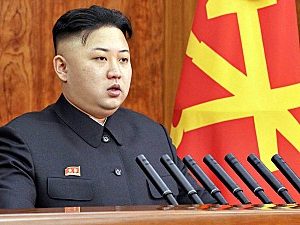North Korea: Fire, Fury and Fear
Alarm bells ringing as rampant speculation breaks out over Pyongyang's 'possible' miniaturized nuclear warheads

Beware the dogs of war. The same intel “folks” who brought to you babies pulled from incubators by “evil” Iraqis as well as non-existent WMDs are now peddling the notion that North Korea has produced a miniaturized nuclear warhead able to fit its recently tested ICBM.
That’s the core of an analysis completed in July by the Defense Intelligence Agency (DIA). Additionally, US intel believes that Pyongyang now has access to up to 60 nuclear weapons. On the ground US intel on North Korea is virtually non-existent – so these assessments amount to guesswork at best.
But when we couple the guesswork with an annual 500-page white paper released earlier this week by the Japanese Defense Ministry, alarm bells do start ringing.
The white paper stresses Pyongyang’s “significant headway” in the nuclear race and its “possible” (italics mine) ability to develop miniaturized nuclear warheads able to fit on the tips of its missiles.
This “possible” ability is drowned in outright speculation. As the report states,
“It is conceivable that North Korea’s nuclear weapons program has already considerably advanced and it is possible that North Korea has already achieved the miniaturization of nuclear bombs into warheads and has acquired nuclear warheads.”
Western corporate media would hardly refrain from metastasizing pure speculation into a “North Korea has miniaturized nuclear weapons” frenzy consuming the cable news cycle/ newspaper headlines. Talk about hearts and minds comfortably numbed by the fear factor.
The Japanese white paper, conveniently, also escalated condemnation of China over Beijing’s actions in both the East and South China seas.
So let’s look at the agendas in play. The War Party in the US, with its myriad connections in the industrial-military-media complex, obviously wants/needs war to keep the machinery oiled. Tokyo, for its part, would much appreciate a pre-emptive US military attack – and damn the inevitable, massive South Korean casualties that would result from Pyongyang’s counterpunch.

Japanese Defense Minister Itsunori Onodera (Source: Wikimedia Commons)
It’s quite enlightening that Tokyo, for all practical purposes, considers China as a “threat” as serious as North Korea; Defense Minister Itsunori Onodera went straight to the point when he said,
“North Korea’s missiles represent a deepening threat. That, along with China’s continued threatening behavior in the East China Sea and South China Sea, is a major concern for Japan.” Beijing’s response was swift.
Kim Jong-Un, demonized ad infinitum, is not a fool, and is not going to indulge in a ritual seppuku unilaterally attacking South Korea, Japan or US territory. Pyongyang’s nuclear arsenal represents the deterrent against regime change that Saddam Hussein and Gaddafi could not count on. There’s only one way to deal with North Korea, as I’ve argued before; diplomacy. Tell that to Washington and Tokyo.
Meanwhile, there’s United Nations Security Council Resolution 2371. It does target North Korea’s major exports – coal, iron, seafood. Coal accounts for 40% of Pyongyang’s exports, and arguably 10% of GDP.
Yet this new sanctions package does not touch imports of oil and refined-oil products from China. That’s one of the reasons why Beijing voted in favor.
Beijing’s strategy is a very Asian attempt to find a face-saving solution – and that takes time. UNSC resolution 2371 buys time – and may dissuade the Trump administration, for now, from going heavy metal, with horrible consequences.
Chinese Foreign Minister Wang Yi cautiously stated the sanctions are a sign of international opposition to North Korea’s missile and nuclear weapons programs. The last thing Beijing needs is a war right on its borders, also bound to negatively interfere with the expansion of the New Silk Roads, a.k.a. Belt and Road Initiative (BRI).
Beijing could always work on re-building trust between Pyongyang and Washington. That’s an order taller than the Himalayas. One just needs to look back at the 1994 Agreed Framework, signed during Bill Clinton’s first term.
The framework was supposed to freeze – and even dismantle – Pyongyang’s nuclear program and was bound to normalize US-North Korea relations. A US-led consortium would build two light-water nuclear reactors to compensate for Pyongyang’s loss of nuclear power; sanctions would be lifted; both parties would issue “formal assurances” against the use of nuclear weapons.
Nothing happened. The framework collapsed in 2002 – when North Korea was enshrined in the “axis of evil” by the Cheney regime. Not to mention that the Korean War is still, technically, on; the 1953 armistice was never replaced by a real peace treaty.
So what next? Three reminders.
1) Beware of an engineered false flag, to be blamed on Pyongyang; that would be the perfect pretext for war.
2) The current narrative is eerily similar to the usual suspects blaring since forever that Iran is a heartbeat away from “building a nuclear weapon”.
3) North Korea holds trillions of US dollars in unexplored mineral wealth. Watch the shadowplay by candidates bound to profit from such juicy loot.

